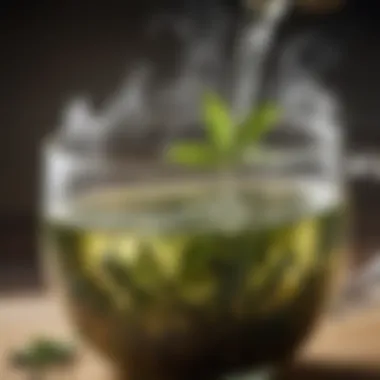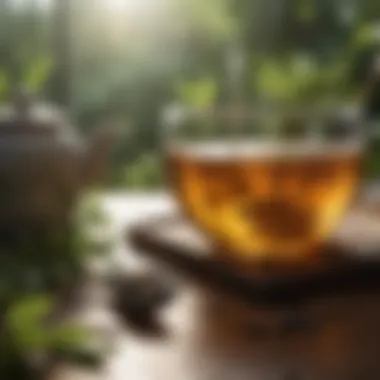Exploring Anti-Inflammatory Teas for Reducing Swelling


Intro
Teas have transcended mere beverages. In recent years, there is increasing interest among health professionals in their anti-inflammatory properties. The dialogue surrounding wellness is often complex; thus, examining natural remedies, such as therapeutic teas, could be a practical low-risk approach. This exploration focuses on teas known for their ability to reduce swelling and address inflammation, a growing concern impacting many.
Well-Being Overview
Prelude to the topic
The modern understanding of wellness incorporates both mental and physical well-being. Many people encounter various forms of inflammation, whether due to stress, lifestyle, or dietary choices. Teas offer a gentle intervention worth considering.
Importance of focusing on this aspect of well-being
Reducing inflammation can profoundly influence overall health. By integrating specific teas into daily routines, individuals may experience lesser swelling, improved mobility, and enhanced well-being. This article aims to present a comprehensive view of teas grounded in research and tradition, enabling informed health choices.
Exploring Teas for Swelling
Numerous varieties of teas offer potential benefits for inflammation and swelling recovery. The ingredients old practices combined with contemporary research support their therapy. Certain flavors such as green tea and ginger tea stand out for their efficacy.
- Green Tea
Green tea is renowned for its antioxidant properties. A substance called catechin works on the immune system, reducing inflammation.
During studies, participants consuming green tea showed lower levels of swelling-related markers. Incorporating it into one's life could mean steeping the leaves for 3-5 minutes to maximize flavor and health benefits. - Ginger Tea
Research has lauded ginger for its extensive health benefits. Its compounds, gingerols and shogarols, contribute to reduced inflammation. Drinking ginger tea, often with honey for taste, provides not only hydration but also valuable anti-inflammatory support. - Turmeric Tea
Turmeric, specifically its active component.curcumin, is another stellar anti-inflammatory agent. Brewing turmeric with black pepper enhances absorption, making it more effective. Individuals often mix turmeric with milk or alternative milks to enjoy its full range of benefits.
Antecedent Literature
Research spans both history and contemporary studies, showcasing the importance of these teas instrumentally. This can guide those exploring natural means to alleviate discomfort and foster resilience against inflammation effectively.
“Tea drinking can serve as a culturally appropriate response to inflammation, demonstrating the adage of assimilation and leveraging the past in treatment.” - Health Professional Journal, 2022.
Navigating which tea to choose may depend significantly on individual lifestyle choices. Each type presents a unique flavor profile and set of conditions it ameliorates. Understanding these can empower individuals in curating their wellness routines.
Through this nuanced approach, individuals have a dynamic set of choices available. Embracing these liquid remedies means understanding not only their pleasant taste but also their complex histories and health effects.
Prelims to Swelling and Inflammation
Understanding swelling is essential for multiple reasons. As a natural body response, swelling often indicates an underlying issue. It serves as a sign of inflammation, which paints a broader picture of health. Increasing awareness regarding swelling contributes to better personal health regimens. The concept cuts across various disciplines from conventional medicine to wellness practices.
Understanding the Nature of Swelling
Swelling, also known as edema, occurs when excess fluid collects in body tissues. This process, while sometimes unnoticeable, can significantly influence a person's quality of life. Swelling often arises in specific areas such as the legs, ankles, and hands, creating discomfort or altering daily activities. From an anatomical point of view, the phenomenon aims to protect body parts through heightened blood flow, triggering the immune response to any form of injury or irritation.
Commonly, swelling is categorized as acute or chronic. Acute swelling usually appears suddenly and might quickly resolve. Sore areas, minor injuries, or allergic reactions exemplify this category. Conversely, chronic swelling tends to persist, often indicating persistent issues such as chronic inflammation or medical conditions.
Common Causes of Swelling
Several factors can trigger swelling. Some of these include:
- Injuries: Sprains, fractures, or some physical traumas that lead to localized swelling.
- Inflammatory diseases: Conditions like arthritis, which directly target the joints, causing persistent swelling.
- Infections: When healing occurs, fluids can accumulate as immune response swells those areas.
- Medications: Some drugs may cause fluid retention, leading to widespread swelling.
- Diet and Lifestyle: High sodium intake can lead to water retention; likewise, prolonged periods of inactivity can also trigger abnormal swelling.
Being aware of these factors can aid individuals in managing their symptoms more effectively. It helps embrace an informed perspective when addressing swelling or related inflammation.
The Role of Teas in Reducing Swelling
Tea has a unique place in the realm of natural remedies. It has been consumed for centuries, not just for its flavor but also for its potential health benefits. In the context of swelling and inflammation, the role of teas becomes particularly noteworthy. Teas may offer an accessible and effective way to manage inflammation and related issues. Understanding their mechanisms, ingredients, and benefits can guide individuals in their wellness journey.
Research supports the claim that certain teas possess anti-inflammatory properties. For many people, including health professionals and wellness coaches, incorporating these herbal drinks into daily routines may provide pivotal support in managing inflammation. Teas can serve as complementary strategies alongside traditional treatments, promoting a holistic approach to health.


Tea as a Natural Anti-inflammatory Agent
Teas are impressive when it comes to addressing inflammation. Many varieties contain compounds known as polyphenols, which have shown effectiveness in reducing swelling. Green tea, for example, is particularly rich in epigallocatechin gallate, or EGCG. Studies demonstrate that EGCG can inhibit inflammatory pathways within the body, making green tea a preferred selection for inflammation concerns.
The brewing process of tea also plays a role. When brewed properly, the nutrients and beneficial compounds are more readily extracted. Unlike some processed beverages, teas retain ample antioxidants, essential in fighting oxidative stress, a contributor to inflammation.
Quality matters here. Opting for high-quality, whole-leaf teas allows for maximal extraction of these anti-inflammatory compounds. It may also involve considering caffeine content. Some individuals find their inflammation worsens with caffeine, although this can vary from person to person.
Consuming certain teas can help moderate bodily processes involved in swelling, encouraging smoother recovery and a general sense of wellbeing.
The Benefits of Herbal Teas
The allure of herbal teas goes beyond their delightful flavors. These infusions offer a diverse array of properties beneficial for managing inflammation.
Popular choices include:
- Turmeric tea: Contains curcumin, renowned for its strong anti-inflammatory effects.
- Ginger tea: Beanlong revered for its warming properties and ability to soothe digestive woes while tackling inflammation.
- Chamomile tea: Known for its calming effects, it also aids as an anti-inflammatory agent.
- Peppermint tea: Offers freshness and potential relief from digestive irritation, influencing inflammation.
Herbal teas may also contribute to an overall enhancing of mood. Approaches combining relaxation and nourishment yield positive results for both mental and physical states. For wellness coaches and fitness trainers advising individuals on natural remedies, herbal teas present a smart, culturally rich alternative.
brewing herbal teas can also be tailored—infusions often vary concerning steeping time and temperature, impacting the profiles of nutrients. Personalized drinks can enhance the experience.
Addressing how these teas can be integrated into daily life can empower those seeking natural inflammation control methods. Buildings connect between understandings of benefits, flavors, and practical savvy add-value to consuming tea as a wellness strategy.
In summary, utilizing teas for inflammation not only highlights their efficacy but also promotes practical steps that anyone can undertake to contribute to their health. It opens a world of choices which can enrich one's overall complete wellness plan.
Popular Teas Known for Their Anti-inflammatory Properties
The significance of using teas known for their anti-inflammatory properties cannot be overstated. As more people seek natural remedies for managing swelling and inflammation, seeking effective beverages to incorporate into one’s regimen is necessary. Teas are not only enjoyed for their diverse flavors but also for their health benefits. Understanding specific teas in-depth can enhance one's wellness approach. Each tea brings unique compounds and elements that can reduce symptoms and support a balanced lifestyle.
Green Tea and Its Active Compounds
Green tea is widely recognized for its health-promoting properties. Its active components, principally polyphenols such as epigallocatechin gallate (EGCG), exhibit substantial anti-inflammatory effects. These compounds work by modulating inflammatory markers and inhibiting the action of free radicals in the body. Additionally, research indicates that those who regularly consume green tea may experience fewer incidences of chronic inflammation, lending further credibility to its inclusion in health preservation routines.
Turmeric Tea: Curcumin's Role in Inflammation
Turmeric tea, often made with ground turmeric and hot water or milk, is profoundly beneficial for reducing swelling. Curcumin, the primary active compound, demonstrates potent anti-inflammatory properties by influencing various biochemical pathways in the body. Its ability to suppress inflammatory cytokines makes it a significant player in combating inflamed conditions. This tea is not only flavorful but can contribute to overall wellness when consumed regularly.
Ginger Tea: A Time-Honored Remedy
Ginger tea has been used for centuries as a traditional remedy for various ailments, including inflammation. The active substances like gingerol are responsible for its anti-inflammatory effects. Ginger affects both the perception of pain as well as its inflammatory markers. Regarding a diet aimed at reducing swollen areas of the body, drinking ginger tea becomes a complementary guard against inflammation.
Peppermint Tea: Cooling and Soothing Effects
Peppermint tea is known for its refreshing flavor, but it also plays a role in alleviating swelling. Its menthol content provides a cooling sensation which can soothe irritated tissues. This tea also has pain-relieving properties, and research suggests it may help with digestive discomfort, which can sometimes accompany inflammation. Regular consumption might yield benefits that aid overall health.
Chamomile Tea: Relaxation and Relief
Chamomile tea is often associated with relaxation. However, its anti-inflammatory properties are equally noteworthy. The active components, e.g., chamazulene, demonstrate significant capacity to reduce inflammation. Especially helpful in calming non-specific skin irritations and pain, chamomile tea can easily be integrated into wellness routines focused on recovery and relief.
Incorporating these teas into daily rituals can foster a natural approach to managing inflammation and enhancing overall well-being.
Each of these teas showcases valuable benefits that can reduce swelling while promoting various health advantages. Adopting just a few of these options allows individuals to thoughtfully integrate them into a holistic, wellness-focused lifestyle.
Mechanisms Behind Teas' Efficacy


Understanding how teas function as natural remedies for inflammation is essential. Once we delve into the scientific aspects of how these beverages interact with the body, we can better appreciate their role in health and wellness. Here, we will explore crucial elements such as polyphenols and antioxidants that contribute to teas' supportive nature. Additionally, mapping out how teas modulate inflammatory pathways sheds light on why their consumption can make a tangible difference in inflammation management.
Understanding Polyphenols and Antioxidants
Polyphenols are compounds extensively found in tea. They owe the primary health benefits that researchers often highlight. There are several types of polyphenols in tea, like flavonoids and catechins, which have been well studied for their anti-inflammatory properties.
Here’s why polyphenols matter:
- Reduction of Free Radicals: Antioxidants combat oxidative stress caused by free radicals, a common factor in chronic inflammation.
- Cell Signaling: They can also interfere with cell signaling used in the inflammatory response, helping to downregulate unnecessary responses of the immune system.
- Supporting Cellular Health: Some studies mention that polyphenols assist in maintaining cell health under stress.
Incorporating teas rich in polyphenols can enhance dietary interventions and support well-being.
How Teas Modulate Inflammatory Pathways
The mechanisms behind tea's anti-inflammatory effects revolve largely around how they influence the body's inflammatory pathways. While this area can be complex, a few points stand out.
Key Influences on Inflammation:
- Cytokine Production: Certain components in tea are known to regulate cytokine production. Cytokines are small proteins crucial in cell signalling during immune responses. By modulating these proteins, teas can often reduce inflammation.
- NF-kB Pathway Inhibition: Research shows teas may inhibit the NF-kB pathway, which plays a critical role in inflammatory responses and chronic conditions. By blocking this pathway, inflammation can potentially be kept at bay.
- Enhanced Immunity: Teas can bolster the body's natural defenses. A balanced immune response is essential in preventing excessive or chronic inflammation.
These insights provide a holistic view of why teas should be considered as viable options in fighting inflammation. They not only offer benefits through direct engagement with the body’s biochemical processes but also promote a more balanced overall health perspective.
“Integrating teas into a dietary regime can facilitate better inflammation management by targeting fundamental molecular systems.”
Possible Side Effects and Considerations
Understanding possible side effects and considerations when using teas as remedies for inflammation is crucial. While many teas can bring relief from swelling, they are not without risks. Every individual is unique, and their reactions can vary significantly. Knowledge of these potential concerns can guide effective usage while minimizing adverse effects.
Potential Allergic Reactions
Allergic reactions can occur with almost any substance, teas included. Ingredients derived from plants might elicit unfamiliar responses in some individuals. For example, chamomile tea, although known for relaxation, belongs to the aster family. Those allergic to ragweed might find themselves facing unpleasant responses when consuming chamomile. Similarly, ginger and peppermint have at times been linked to allergies, although these occurrences tend to be rare.
When drinking a new tea for the first time, it is prudent to start with a small amount and monitor the body’s reaction. Signs of an allergic reaction may include hives, itching, difficulty breathing, or gastrointestinal distress. If any of these occur, it is essential to stop consumption immediately and consult a healthcare professional.
Interactions with Medications
It is very vital to be aware of how herbal teas might interact with medications. Certain teas might interfere with drug efficacy, leading to unwanted outcomes. For example, green tea, known for its high levels of caffeine, can interact with anticoagulant medications. The caffeine content may amplify the effects on the heart and blood pressure.
Additionally, herbal teas often have compounds that could impact liver enzymes responsible for breaking down medications. Therefore, teas such as those containing turmeric or ginger could alter how various pharmaceuticals are metabolized, leading to insufficient treatment or unexpected side effects.
Here are some recommended considerations to ensure safe tea consumption when on medication:
- Consult a healthcare professional before integrating new teas into your routine.
- Research the specific teas and their effects on your current medications.
- Keep a close eye on any alterations in your condition after starting new teas, especially following new medication.
Practical Tips for Incorporating Teas into Your Diet
Incorporating teas into your daily diet can offer substantial health benefits, especially for addressing inflammation. As individuals seek natural remedies to manage swelling and inflammation, understanding how to integrate these teas effectively becomes essential. This section discusses methods to select quality teas, ways to brew them properly, and suggestions for pairing them with other anti-inflammatory foods. A well-rounded approach will ensure the maximization of health benefits related to tea consumption.
Selecting Quality Teas
Choosing high-quality teas is critical for obtaining the desired effects. Several factors can influence the quality of tea, such as source, preparation, and packaging. When selecting teas, look for practices like sustainable sourcing and minimal processing.
- Check ingredients: Look for pure and organic varieties, particularly for herbal teas. Some lower-quality teas may contain fillers or harmful additives.
- Consider brand reputation: Well-reviewed brands provide transparency about their sourcing and production, reducing the chance of contaminants.
- Opt for loose leaf when possible: Loose leaf teas generally preserve more of their natural oils and taste, enhancing their effectiveness.


Optimal Brewing Methods
Brewing methods greatly influence the extraction of beneficial compounds from tea. Different types of tea require specific temperatures and steeping times to optimize flavor and health benefits.
- Know the temperature:
- Trial and error: Adjust steeping times ranging from 2 to 5 minutes based on desired strength and flavor preferences. Stronger teas can release more beneficial compounds but may become bitter.
- Use filtered water: Tap water can affect tea’s taste. Filtered water can achieve a cleaner and purer flavor profile.
- Green tea: 70-80 °C
- Black tea: 90-100 °C
- Herbal tea: 100 °C
Pairing Teas with Other Anti-inflammatory Foods
Combining teas with other anti-inflammatory foods enhances therapeutic effects. These combinations can create a more powerful remedy against swelling.
- Citrus fruits: Adding a squeeze of lemon or lime can elevate the flavor profile and add vitamin C, supporting immune function.
- Spices: Mixing in spices such as turmeric or cinnamon with tea can increase anti-inflammatory benefits. Starting each brew with a pinch of turmeric can greatly enhance effectiveness.
- Nuts and seeds: Snack on almonds or chia seeds alongside tea for extra healthy fats that may sustain anti-inflammatory efforts a long time.
Always check for specific a dditional ingredients to avoid safety risks, especially for those with allergies.
End: A Holistic Approach to Managing Swelling
Taking a holistic view of managing swelling and inflammation integrates multiple aspects of health and wellness. Treating swelling merely with localized remedies may not provide long-lasting relief. This article underscores the importance of viewing swelling through a broader lens—both physical and psychological.
To effectively address inflammation, one needs to adopt lifestyle changes, including dietary adjustments, regular physical activity, and stress management techniques. The exploration of teas known for their anti-inflammatory benefits provides direct and accessible options. However, embracing these as part of a more balanced lifestyle can amplify their effectiveness. Finding synergy between various practices may lead to a compounded benefit when it comes to reducing swelling.
The Importance of a Balanced Lifestyle
A balanced lifestyle is crucial in managing swelling holistically. This involves more than just occasional remedies; it requires a commitment to daily habits that promote overall health. Consuming a diet rich in whole foods, staying hydrated, and maintaining adequate physical activity are crucial components. Swelling often results from factors like poor nutrition through high-consumption of processed foods, lack of fluid intake, or inactivity.
- Nutritious Diet: Focus on anti-inflammatory foods, such as leafy greens, berries, nuts, and fatty fish. These foods are high in nutrients and can aid in reducing inflammation.
- Hydration: Ensure proper hydration to help your body's systems function optimally, as dehydration can exacerbate inflammation.
- Regular Exercise: Engaging in moderate and consistent exercise supports circulation and can help reduce the risk of swelling conditions.
- Adequate Sleep: Sleep regulates many bodily processes, including inflammation. Strive for quality sleep to restore and rejuvenate the body.
Adopting these elements into one's routine can create an environment where swelling does not persist or recur frequently.
Integrating Teas with Mindfulness and Self-care Practices
Integrating teas into daily self-care routines reflects an understanding of both the mind and body connection in managing health. The importance of mindfulness in selecting and consuming tea cannot be understated: it adds a quality of care to what may often be a rushed or distracted act. Brewing a cup of tea can become a meditative practice rather than just a routine task.
- Brewing as Ritual: Understand the preparation process of different teas. Paying attention to the aroma, color, and flavor promotes awareness and relaxation.
- Quiet Moments: Use tea time as a designated moment to disconnect from stress. Turn off digital devices and focus on the present. This quiet engagement supports your overall wellbeing.
- Knowledge Engagement: Educate yourself about the specific benefits of the teas you're consuming—this understanding fosters a greater connection and appreciation for the drink you selected.
Mindful consumption creates a break from the rush of daily life, offering moments to reflect and heal. Through this combination of tea and self-care, individuals can address not only internal swelling but also the mental and emotional factors that contribute to physical discomfort.
Ultimately, managing swelling requires a commitment to various lifestyle choices and wellness practices.
Integrating teas as part of a broader strategy empowers individuals to take control of their health and promote ongoing wellbeing.
References for Further Reading
Understanding more about teas and their anti-inflammatory effects is essential for readers who aim to integrate these natural remedies into their routines for managing swelling and inflammation. The right resources empower individuals by providing them foundational knowledge and further insights into the subject explored in this article. By referring to scholarly research and reputable publications, readers can develop a more profound understanding of the mechanisms and outcomes associated with various teas. This section outlines valuable resources for advancing your knowledge in this domain.
Research Articles on Anti-inflammatory Teas
A selection of research articles forms the backbone of evidence supporting the anti-inflammatory properties of teas. These works delve into scientific studies that explore various factors:
- The bioactive compounds present in teas which contribute to their effectiveness in modulating inflammation.
- Changes in biomarkers of inflammation after consuming specific teas like green or ginger tea.
- Highlighted case studies demonstrating the clinical applications of herbal teas in reducing swelling and pain.
Exploring these articles not only affirms the anecdotal benefits ascribed to teas but also provides a deeper understanding of their application in everyday life. Websites like Wikipedia and Britannica can serve as starting points for finding detailed historical and contextual backgrounds on specific teas. Moreover, peer-reviewed journals are invaluable, as they provide validated claims through systematic research processes.
Books on Herbal Remedies and Wellness
Books can enhance the understanding of herbalism and natural solutions to inflammation. They provide comprehensive knowledge that connects ancient wisdom with modern findings. Essential elements to look for in these books include:
- Guides on specific herbal constituents and their origins.
- Recipes for brewing teas that target inflammation.
- Insightful stories and practices from individuals who have benefitted from these remedies.
Some recommended books provide patients and health practitioners with education and practical guidance. Engaging literature oftentimes intersects wellness philosophies grounded in herbal practices. You can even found groups on platforms like Reddit where discussions on specific teas or books occur, enriching one's understanding through shared experiences and opinions. These resources collectively contribute to a more understandingful approach to using teas for reducing swelling.



